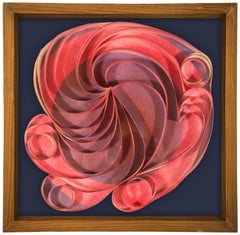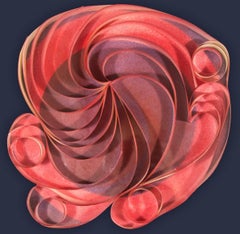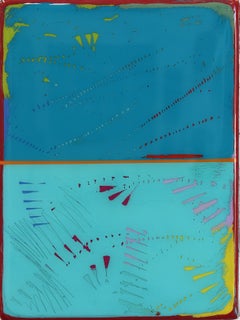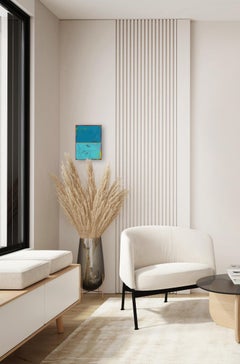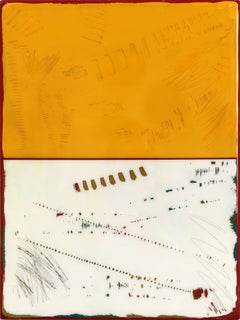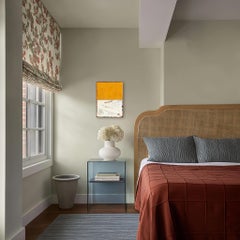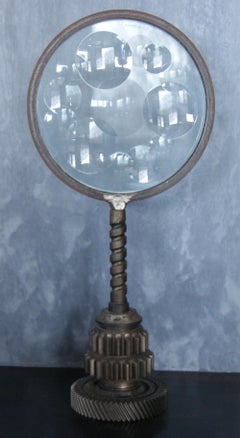By Feliciano Béjar
Located in Surfside, FL
Genre: Latin American
Subject: Abstract
Medium: Mixed Media, Collage
Country: Mexico
Dimensions w/Frame: 16.75 x 16.5
Feliciano Béjar Ruíz (1920 – February 1, 2007) was a Mexican artist and artisan, best known for a style of sculpture called “magiscopios” which involved various materials along with crystals and/or lenses to play with light or create distorted visions. He was born in rural central Mexico and was completely self-taught as an artist. He was creative as a young child, drawing and creating his first sculpture like pieces from papier-mâché. His art career began in New York, where he had travelled and lived for a time in Hell’s Kitchen. His drawing the attention of Arthur Ewart and Frances Coleman, with the latter helping him have his first exhibition and whose husband helped sponsor his time in Europe. In his later life, Béjar withdrew from the art world for about sixteen years, disillusioned with it and retreating to his ranch in the State of Mexico. He returned in 1998, with a retrospective of his work in Mexico City and continued to show his work until shortly before his death.
He worked as an assistant to a carpenter, sweeping out the shop in exchange for wood scraps. He used these to create toys and even large imaginary cities.
When he was fifteen, he began to teach himself art using various scrap materials. At this time muralist José Clemente Orozco was in his town to paint scenes of the Mexican Revolution on the town library. Bejar brought him some drawings to show, he did not want to see them. Later in life he stated that he did not think well of the muralists and considered them false and frauds. He said that their work was supposedly for the people but they could not be understood without interpretation and the main ones (Rivera, Siqueiros and Orozco) shut out other artists.
When he got to New York in the 1940s, he was disappointed and thought it ugly. He wanted to return but had no money so he had to work menial jobs and live in Hell’s Kitchen. During this time in New York, he was put in touch with English painter Arthur Ewart who encouraged him to get back to art, particularly painting. He also met socialite Frances Colman, while copying paintings at the Metropolitan Museum of Art, who helped him get started selling his work. In 1947, he returned to Mexico. Coleman helped him have an exhibition in New York and in 1949, Béjar traveled to Paris and bicycled through Europe to study the art in the museums there, sponsored by UNESCO and Coleman’s husband. He returned again to Mexico in 1950.
He returned again to Europe in 1956, where he painted and worked as a movie extra and radio announcer.
In 1960, Béjar met Englishman and historian Martin Foley, who had come to Mexico to study. They remained friends for over forty years and lived together at Béjar’s ranch until his death, with Foley writing Béjar’s biography. Foley never entered Béjar’s studio because he was concerned with stepping on something.
However, he considered himself an artisan first, valuing his skills as a carpenter, metalworker and bricklayer, rebuilding the house and gardens himself.
In the early 1990s, he withdrew from his art career, disillusioned by the art work, and in 1993, he was confined to a mental facility by his family involuntarily. Although he left the hospital some time later, a number of his family members still considered him crazy.
Béjar was considered to be an environmentalist. One reason for this was that in his early career, he had a sign in front of his house offering to take used materials for his art, and received much. It made him reflect on how much is wasted. His interest in ecology was also spurred by his time in Mexico City, when he lived for a while near Paseo de la Reforma, seeing how its trees and old mansions were deteriorating.
Béjar died in Mexico City on February 1, 2007, of heart failure while in a hospital for tests. He was 86. He left behind about 100 unfinished pieces because of his system of working. He was buried at his ranch in the State of Mexico. Much of his finished and unfinished work is now in the hands of Martin Foley.
Although Béjar did painting, handcrafts and even trades, he is best known for his sculpture, especially a class of sculpture called “magiscopios.” These were created with metal, glass, crystal, plastic and resins, and feature crystals and lenses that distort the onlookers view. He created the first of these with waste metal and other scraps. After he created his first one, he invited Paco de al Maza, Justino Fernández, Salvador Novo and others for dinner. After seeing the work they thought about names with Jorge Hernández...
Category
1980s Modern Feliciano Béjar Art
